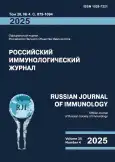Особенности хемокинового профиля у женщин с аденомиозом
- Авторы: Мусаходжаева Д.А.1, Рустамова Н.Б.1, Азизова З.Ш.1, Маннопжонов П.Б.1, Исмаилова Д.У.2
-
Учреждения:
- Институт иммунологии и геномики человека Академии наук Республики Узбекистан
- Ургенчский филиал Ташкентской медицинской академии
- Выпуск: Том 28, № 4 (2025)
- Страницы: 1061-1066
- Раздел: КРАТКИЕ СООБЩЕНИЯ
- URL: https://journals.rcsi.science/1028-7221/article/view/333270
- DOI: https://doi.org/10.46235/1028-7221-17226-COT
- ID: 333270
Цитировать
Полный текст
Аннотация
Аденомиоз – это хроническое воспалительное заболевание, которое характеризуется проникновением эндометриоидной ткани в миометрий и активацией иммунно-воспалительных реакций как на местном, так и на системном уровне. Важным аспектом патогенеза заболевания являются изменения в регуляции баланса цитокинов и хемокинов, нарушения ангиогенеза и процессы ремоделирования стенки матки. Все эти факторы приводят к прогрессированию заболевания и ухудшению состояния пациенток. Современные исследования все чаще акцентируют внимание на роли иммунной системы, в частности хемокинов, в развитии аденомиоза, а также на возможностях использования иммунологических маркеров для диагностики и мониторинга прогрессирования патологии. Цель проведенного исследования заключалась в анализе хемокинового профиля у женщин с аденомиозом степени I-II. Были изучены концентрации следующих хемокинов в плазме крови: IL-8, MCP-1, IP-10, MIP-1β. В исследовании приняла участие 81 женщина репродуктивного возраста, проживающие в городе Ургенч Хорезмской области, из которых 56 пациенток имели диагностированный аденомиоз разной степени (степень I и II), а 25 здоровых женщин составили контрольную группу. Методом определения концентрации хемокинов был выбран иммуноферментный анализ (ИФА), а для обработки статистических данных использовался t-критерий Стьюдента. Результаты исследования показали значительные изменения хемокинового профиля у пациенток с аденомиозом. Уровни IL-8, MCP-1 и MIP-1β значительно повышены у пациенток (в 3,7, 1,9 и 1,6 раза соответственно), что свидетельствует о развитии воспалительного процесса и активизации различных компонентов иммунного ответа. Повышение уровня IL-8 связано с ангиогенезом и нейтрофильной инфильтрацией тканей, MCP-1 – с привлечением моноцитов и макрофагов в очаг воспаления, а MIP-1β – с активацией врожденного иммунитета. При этом уровень IP-10 продемонстрировал тенденцию к снижению (~12%), что может указывать на снижение антиангиогенной активности и нарушение Th1-ответа. Таким образом, результаты исследования подтвердили наличие выраженного дисбаланса хемокинов при аденомиозе и обозначили перспективные направления в диагностике и мониторинге данного заболевания. Изучение иммунных механизмов может быть полезным для разработки новых подходов к терапии, основанной на коррекции выявленных нарушений.
Полный текст
Открыть статью на сайте журналаОб авторах
Дилором Абдуллаевна Мусаходжаева
Институт иммунологии и геномики человека Академии наук Республики Узбекистан
Автор, ответственный за переписку.
Email: nozam91@mail.ru
д.б.н., профессор, заведующая лабораторией лаборатории «Иммунология репродукции»
Узбекистан, г. ТашкентНазокат Бахтиёровна Рустамова
Институт иммунологии и геномики человека Академии наук Республики Узбекистан
Email: nozam91@mail.ru
базовый докторант
Узбекистан, г. ТашкентЗухра Шухратовна Азизова
Институт иммунологии и геномики человека Академии наук Республики Узбекистан
Email: zuhra_0203@list.ru
ORCID iD: 0009-0009-8723-3002
к.б.н., старший научный сотрудник лаборатории «Иммунология репродукции»
Узбекистан, г. ТашкентП. Б. Маннопжонов
Институт иммунологии и геномики человека Академии наук Республики Узбекистан
Email: nozam91@mail.ru
младший научный сотрудник лаборатории «Иммунология репродукции»
Узбекистан, г. ТашкентД. У. Исмаилова
Ургенчский филиал Ташкентской медицинской академии
Email: nozam91@mail.ru
свободный соискатель
Узбекистан, г. УргенчСписок литературы
- Deshmane S.L., Kremlev S., Amini S., Sawaya B.E. Monocyte chemoattractant protein-1 (MCP-1): an overview. J. Interferon Cytokine Res., 2009, Vol. 29, no. 6, pp. 313-326.
- García-Solares J., Donnez J., Donnez O., Dolmans M.M. Pathogenesis of uterine adenomyosis: invagination or metaplasia? Fertil. Steril., 2018, Vol. 109, no. 3, pp. 371-379.
- Lin Y., Wang L., Ye M., Yu K.N., Sun X., Xue M., Deng X. Activation of the cGAS-STING signaling pathway in adenomyosis patients. Immun. Inflamm. Dis., 2021, Vol. 9, no. 3, pp. 932-942.
- Liu D., Yin X., Guan X., Li K. Bioinformatic analysis and machine learning to identify the diagnostic biomarkers and immune infiltration in adenomyosis. Front. Genet., 2023, Vol. 13, 1082709. doi: 10.3389/fgene.2022.1082709.
- Luster A.D., Ravetch J.V. Biochemical characterization of a gamma interferon-inducible cytokine (IP-10). J. Exp. Med., 1987, Vol. 166, no. 4, pp. 1084-1097.
- Maurer M., von Stebut E. Macrophage inflammatory protein-1. Int. J. Biochem. Cell Biol., 2004, Vol. 36, no. 10, pp. 1882-1886.
- Rakhila H., Girard K., Leboeuf M., Lemyre M., Akoum A. Macrophage migration inhibitory factor is involved in ectopic endometrial tissue growth and peritoneal-endometrial tissue interaction in vivo: a plausible link to endometriosis development. PLoS One, 2014, Vol. 9, 10, e110434. doi: 10.1371/journal.pone.0110434.
- Selntigia A., Molinaro P., Tartaglia S., Pellicer A., Galliano D., Cozzolino M. Adenomyosis: An update concerning diagnosis, treatment, and fertility. J. Clin. Med., 2024, Vol. 13, no. 17, 5224. doi: 10.3390/jcm13175224.
- Younes G., Tulandi T. Effects of adenomyosis on in vitro fertilization treatment outcomes: a meta-analysis. Fertil. Steril., 2017, Vol. 108, no. 3, 483-490.e3.
- Zhang X., Lv H., Weng Q., Jiang P., Dai C., Zhao G., Hu Y. “Thin endometrium” at single-cell resolution. Am. J. Obstet. Gynecol., 2025, Vol. 232, no. 4S, pp. S135-S148.
Дополнительные файлы







